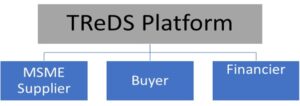Table of Contents
TReDS Platform
TReDS is an institutional mechanism set up to facilitate the discounting of invoices for MSMEs. It is an electronic platform for facilitating the financing / discounting of Micro, Small, and Medium enterprises (MSMEs) trade receivables through multiple financiers. These receivables can be due from corporates and other buyers, including Government Departments and Public Sector Undertakings (PSUs).
Invoice discounting on TReDS involves three participants MSME Supplier, Corporate Buyer, and Financier. The invoice is uploaded by either buyer or supplier depending on the method of discounting and is approved by the other party. Once the invoice is approved the financiers on the platform start to bid on the invoice. The supplier accepts the bid and the discounted amount is credited to its account on T+1 day, where T is the day of acceptance.
Following are the Salient Features of TReDS
- Easy Access to Fund
- No paper Work
- Single Platform for sellers, Buyers, and Financers
- Transact Online
- Competitive Discount Rates
- Seamless Data Flow
- Standardized Practices
Various Parties and their roles in TReDS
Participants in TReDS: Sellers, buyers, and financiers are the participants on a TReDS platform.

Participate as a seller in TReDS: Only MSMEs can participate as sellers in TReDS.
Participate as a buyer in TReDS: Corporates, Government Departments, PSUs, and any other entity can participate as buyers in TReDS.
Participate as a financier in TReDS: Banks, NBFC – Factors, and other financial institutions as permitted by the Reserve Bank of India (RBI), can participate as financiers in TReDS.
TReDS working and various steps take place during financing / discounting through TReDS
Broadly, the following steps take place during financing / discounting through TReDS:
Creation of a Factoring Unit (FU) – standard nomenclature used in TReDS for invoice(s) or bill(s) of exchange – containing details of invoices/bills of exchange (evidencing sale of goods/services by the MSME sellers to the buyers) on TReDS platform by the MSME seller (in case of factoring) or the buyer (in case of reverse factoring);
Acceptance of the FU by the counterparty – buyer or the seller, as the case may be;
Bidding by financiers;
Selection of best bid by the seller or the buyer, as the case may be;
Payment made by the financier (of the selected bid) to the MSME seller at the agreed rate of financing / discounting;
Payment by the buyer to the financier on the due date.
Terms and Definitions related to Factoring
Factoring Unit (FU): A Factoring Unit (FU) is a standard nomenclature used in TReDS for invoice(s) or bill(s) of exchange. Each FU represents a confirmed obligation of the corporates or other buyers, including Government Departments and PSUs.
Who can create an FU: In TReDS, FU can be created either by the MSME seller or the buyer. If an MSME seller creates it, the process is called factoring; if the same is created by corporates or other buyers, it is called as reverse factoring.
Whether TReDS could deal with reverse factoring?: Yes. The TReDS could deal with both receivables factoring as well as reverse factoring.
Would the MSME seller have to pay the financier if the buyer defaults in repayment?: No. The transactions processed under TReDS are “without recourse” to the MSMEs.
Whether any authorization is required to set up and operate a TReDS platform?: Yes, authorization is required to be obtained from RBI under the Payment and Settlement Systems (PSS) Act, 2007.
Eligibility criteria for setting up and operating TReDS: Eligibility criteria to set up and operate a TReDS platform are provided in the guidelines (as amended from time to time) for TReDS issued by RBI.
Classification of Priority Sector Advances:
As per RBI Master Directions FIDD.CO.Plan.BC.5/04.09.01/2020-21 Dated – September 04, 2020 (Updated as on August 02, 2022), Factoring transactions pertaining to MSMEs taking place through the Trade Receivables Discounting System (TReDS) shall also be eligible for classification under priority sector.
TReDS: Process flow- Factoring
| SELLER | BUYER | FINANCIER |
| 1. Seller upload invoice | 2. Buyer accepts the invoice | 3. Financier bids for invoice |
| 4. Seller accepts the bid | 5. Financier disburses funds to the seller | |
| 6. Seller receives funds within 48 hours of invoice acceptance | 7. Buyer pays financier on the due date | 8. Financier receives the outstanding amount |
TReDS: Process flow- Reverse Factoring
| BUYER | FINANCIER | SELLER |
| 1. Buyer upload invoice | 2. Financier bids for invoice | |
| 3. Buyer accepts the bid | 4. Financier disburses funds to the seller | 5. Seller receives funds within 48 hours of invoice acceptance |
| 6. Buyer pays financier on the due date | 7. Financier receives the outstanding amount |
TReDS Advantages
For All Participants:
- Automated Transparent Platform
- Paperless and Hassle-free Platform
- Cost Reduction
For Buyers:
- By enrolling on TReDS, the buyer can properly track its cash flow.
- Can negotiate better terms with MSME Vendors.
- Lower cost of inputs for Buyers.
- Can avail extended credit period.
- Competitive Price Discovery.
- It ensures that payment cycles are smooth and error-free.
- It only takes a small amount of paperwork and money. Transparency is essential.
For Sellers:
- In a reasonable amount of time, the vendor will be able to acquire a receipt of funds.
- Competitive Price Discovery.
- MSMEs have the right to choose the best bid.
- No follow-up with the buyers for payment.
- No dependent on a single financer.
- It only takes a small amount of paperwork and money.
For Financer:
- The Financer may have access to a broader market.
- TReDS ensures instrument qualification.
- Widening the financing options.
- It reduces operational costs.
Settlement file generation in TReDS: A settlement file provides information as to how much amount has to be debited from and credited to the accounts of participants (sellers, buyers, and financiers), due on a particular date/time. In other words, it indicates how much a financier has to pay to an MSME seller, and how much a buyer owes to the financier on a particular date/time. The TReDS entities generate the settlement file and send the same to existing payment systems (National Automated Clearing House) for the actual payment of funds.

Leave a Reply